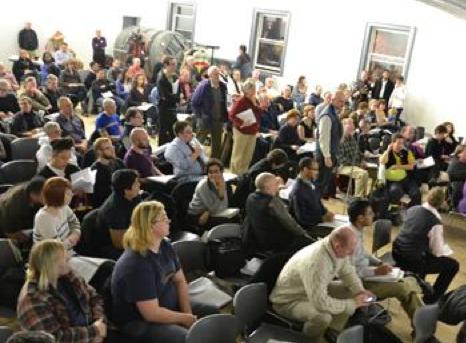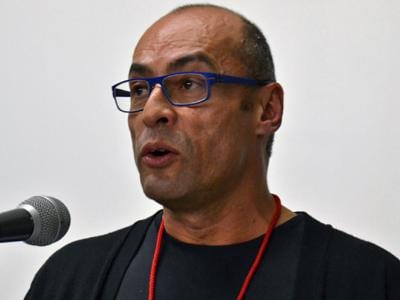
Credit: Marcus McCann
When the Community Advisory Panel (CAP) report was released on Feb 17, Pride Toronto (PT) co-chair Francisco Alvarez accepted all the recommendations “in spirit” and apologized to the community on behalf of the board of directors for the “wrongs” of the past year. It earned him a standing ovation.
“Several recommendations can be implemented very easily, immediately,” he told Xtra. For example, he said, providing additional spaces along the parade route so people with disabilities could leave easily, if needed, is a great idea.
“They’re things we haven’t thought about,” he said. “They’re great suggestions.”
But on Feb 29, Alvarez told Xtra the PT board of directors hasn’t yet implemented any of the CAP recommendations. He says the board has been busy putting together the implementation committee and has been starting the search process for a new executive director (ED).
“Some of the recommendations will require a feasibility process,” he says. “We haven’t had a board meeting since that meeting, so we haven’t made any decisions as a board yet.”
Alvarez says PT will soon begin the search for a new ED, hopefully before Pride Week. The new ED doesn’t have to be from Toronto, but he hopes the top candidate is Canadian.
Community relations and fiscal responsibility will be top priorities for the new ED.
The sweeping CAP report covers all of PT, from finances to entertainment. A significant portion of the document is dedicated to PT’s relations with trans people and people of colour. About 10 of the 232 pages of the report deal with the group Queers Against Israeli Apartheid (QuAIA). But there is no recommendation in the report about whether QuAIA should be kicked out of the parade or not.
Both QuAIA spokesperson Elle Flanders and Kulanu Toronto executive director Justine Apple say they were disappointed CAP didn’t take a stronger position on QuAIA’s presence in the parade.
“I think they dodged the bullet, the Kulanu/QuAIA bullet,” says Flanders. “I think it’s interesting that, in the report, they keep talking about QuAIA, but rarely mention Kulanu. I don’t think that’s out of bias, just the way it’s framed. So if we could reframe it as a dispute between two groups, as opposed to ‘QuAIA in or QuAIA out?’ that would be more helpful going forward.”
Apple says she had hoped CAP would recommend QuAIA be banned from the parade.
“I’m very disappointed CAP didn’t take a stand to ban the group,” she says. “Obviously they took the safe route by maintaining a neutral position on the issue…. The Pride board didn’t take a stand on what was right. What was right would have been to ban the anti-Israel group. Pride is about celebration.”
Flanders says QuAIA should not be kicked out of the parade.
“We should have no fear of each other; we are simply on two different sides,” Flanders says. “Let’s get together, work out our differences and march in peace. To me that would be the dawn of a new day.”
CAP recommends that PT set up a dispute resolution committee to determine which groups can march and where, and which should be excluded altogether. The committee would rule only in the event of a specific complaint and, according to the CAP report, its decisions would be final.
Blockorama organizer Syrus Marcus Ware says that far too much of the report was devoted to QuAIA and that the group wasn’t the only “big issue” facing PT last year.
“There were really two huge issues last year: what was happening with QuAIA and Blockorama,” says Ware. “I’m surprised there wasn’t more flushed out about the complex issues with Blockorama and with other racialized communities. It was all sort of lumped into one ‘racialized communities topic’ over a page and a half.
“It did get a word cloud,” he adds. “Also, after a year filled with teen suicides, I was really surprised there wasn’t much said about youth.”
Blackness Yes! committee member and Blockorama organizer Nik Redman says he is more concerned with the time PT has left to implement recommendations.
“Apologies are great, but we need action behind them,” he says. “Blackness Yes! committee members attended a couple meetings, and we do see some of our recommendations in the report. But we really want to see members of the First Nations communities, South Asian and Latino communities in Toronto all work together.”
Ward 27 Councillor Kristyn Wong-Tam notes Alvarez’s apology was a particularly touching moment that seems to signal the beginnings of change.
“It really felt like there was a lot of healing in the room,” she tells Xtra. “I was really uplifted by the tone of the report. The overall message was positive, and it sounds like people are ready to roll up their sleeves and do some work to rebuild an organization that we all care so deeply about.”
Wong-Tam has offered to help organize World Pride 2014. She says she also plans to help look for a new permanent home for PT that is wheelchair accessible.
CAP held five public consultation sessions in December, which, according to its report, were attended by about 2,000 people. CAP also says it collected 1,600 survey responses and numerous Facebook messages. Two of the public sessions were targeted at the “racialized” community and the trans community, and the feedback is reflected in the report.
But PT youth coordinator Tyler Johnson says queer youth were left out.
“The only mention of ‘youth’ within the CAP report was in the title that was dedicated to ‘age,’” says Johnson. “Even within that section there was no mention of youth, especially those between the ages of 14 and 18 who cannot get into bars and clubs. Ironically, the focus of the Pride Week this year will be youth, and I’m doing everything I can to engage the youth community.”
Johnson says he plans to launch a website, pridetorontoyouth.com, to act as a social network to engage youth at Pride.
Read more of Xtra‘s coverage of the Community Advisory Panel:
EDITORIAL – Time to sow
Advisory Panel offers 133 recommendations to Pride Toronto
Public CAP wrapped up; now what?

 Why you can trust Xtra
Why you can trust Xtra


